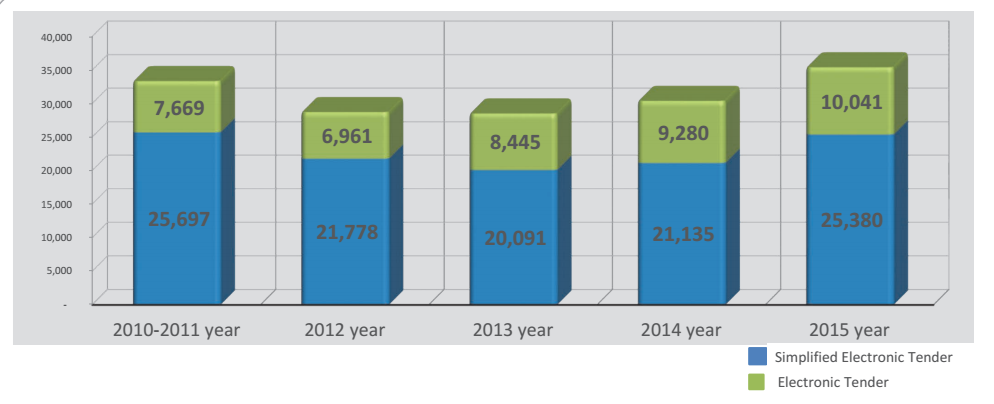
On 16th of January 2017, Government of Georgia introduced draft amendments in Procurement law to the Parliament of Georgia, which has been prepared by State Procurement Agency (SPA).
According to the explanatory note of the draft law, amendments have two main goals: 1. fulfillment of commitments deriving form EU-Georgia Association Agreement; and 2. improvement of dispute settlement procedures defined by the law. Most of the amendments are positive, but there are some risky propositions.
What changes are considered to be introduced in the law?
Draft law envisages two main changes:
- Abolishing simplified electronic tender procedure and maintaining only electronic tender, timeframes of which will increase depending on the estimated price of the procurement;
- Procedure of appealing in the Dispute Resolution Board (DRB) will be changed – the notion of the “interested party” in dispute resolution process will be introduced. Also, the fee of appellation will be established - 2% of value of estimated price of the procurement, but not less than 100 GEL (approximately 40 USD) and not more than 500 GEL (approximately 200 USD).
In addition to these changes: 1. Principles of equal treatment and proportionality will be introduced into the procurement legislation. 2. The procurer will be required to specify technical and performance specifications of the object of procurement. 3. Changes in tender conditions/documentation will re-launch the timeframe for preparing and submitting the bid.
Association Agreement and obligations of Georgia
Georgia-EU Association Agreement (AA) entered into force on 1 July 2016. By implementing the AA (141-149 articles and Annex XVI), many other changes will be made to the procurement legislation, which will ensure compliance of the Georgian procurement legislation with that of the EU.
Implementation process is divided into - 5 phases spanned over 8 years. All envisioned changes, except for changes on appeal procedure in the DRB, comply with the obligations of the first phase (first 3 years) obligations.
Benefits of draft law
The positive change in Procurement law is the introduction of principles of equal treatment and proportionality, as well as the establishment of the obligation for the procurer to specify technical and performance specifications for the object of procurement. This amendment complies with the international standards and is a direct obligation of the Association Agreement.
Abolishment of simplified electronic tender represents a positive change. The problem with this procedure is that it can be used when the estimated price of the procurement is as high as 200,000 GEL (approximately 80 000 USD), whereas a potential supplier has a minimum time (3 days) to study the proposal and submit the bid. This period is unreasonably short, and does not meet any international standards, including EU standards.
The problem is aggravated by the fact that the majority of tenders (70%) are conducted by simplified electronic tender procedure (see. Figure # 1). As a result, number of failed tenders is high. For example, in 2015 31% of the tenders either failed, were suspended/cancelled or ended with a negative outcome.
Figure #1: number of tenders by the procedure

Source: “State procurement Agency, activity report of 2015”, State Procurement Agency, Tbilisi 2016, page 10.
As a result of the changes, timeframe for preparing and submitting thee bid will be 7 days and will increase as the value of the tender increases. Following of explanatory note of draft law:
"With the current law, the procurer is given the opportunity to change the tender documentation 1 minute before of deadline or preparing the bid, which is an inconvenience for bidders ... and also creates corruption risks as procuring entity may intentionally change the tender documentation for one candidate/bidder."
Possible risks in planned changes
Re-launching the time necessary for preparing and submitting the bid in cases when tender documentation is changed can have positive as well as negative results. In particular, re-launching the time can be used by a dishonest procurer to artificially create urgent necessity clause, which allows the procuring entity to conclude a direct contract with the desired supplier.
Among the changes included in the draft law, changes to the dispute settlement procedures potentially involve certain risks. Under the current rules, any natural or legal person registered in the system can appeal for free, at any stage of the tender process.
The change leaves the right to appeal decisions of the procuring entity only to “interested parties” (direct participants of tenders), whereas those who do not participate in the tender will only have the possibility to appeal the content of the tender documentation. Additionally, a fee for appealing the decision of the procuring entity is planned to be introduced - 2% of the estimated value of the procurement.
The draft law explains the need for changes for following reasons:
Argument 1 – According to the explanatory note of draft law, the existing appeal procedure «establishes unreasonably higher standard than is stipulated in the procurement in the EU directives".
Comment: the explanatory note does not explain why establishment of high standards is unjustified. EU directives are not asking to remove high standard in case of its existence.
Argument 2 – accordingly of explanatory note: “This approach [the existing rule of appeal], in many cases leads to delay and unjustified increase of the number of disputes, because the appellants failed to justify the claim for legal interest, but the DRB does not have the right to refuse their complaint.” Additionally, the explanatory note also states that the rule “helps unsubstantiated complaints, which lead to unreasonable delays in the public procurement process”
Comment: Although the DRB has no right to refuse a complaint, it is able to inspect it before the hearing and to grant it the status of being admissible or inadmissible. For example, in 2015, 188 complaints were declared inadmissible (18% of complaints) and in these cases procurement procedure was not stopped. In support of the changes, statistics are cited, according to which, from January 1 to November 1 of 2016, persons with no evident interest presented 283 complaints (21% of complaints) to the DRB. Out of these complaints, almost 96% were not satisfied and according to the SPA, there were circumstances which showed that the complaints were used to hinder the procurement process.
These statistics show an evident problem in the dispute settlement procedure and actions directed towards eradicating such issues are necessary. However, all risks should be taken into account. Introducing the fee may be counter-productive and ward off the appellants who are interested parties to the dispute. Even though the fee can only be as much as 500 GEL (approximately 200 USD), it could still be a burden for small and medium sized businesses. Additionally, limiting the right of any person to complain against the decision of the procuring entity may weaken the mechanism of public oversight over the procurement processes. Given the nature of the problem, it would be much less risky to strengthen already existing filtering mechanisms, such as granting the status of admissible and inadmissible complaints by the SPA.
Conclusion
Most of the proposed amendments to the public procurement law have positive and helpful impact. Changes are introduced in the framework of obligations under the AA and will promote the integration of Georgia into the EU, improve procurement legislation and improve the procurement process.
However, the draft law still contains risks. In particular, the changes of dispute settlement procedures can eventually negatively affect the dispute settlement mechanism. The planned changes may create additional obstacles for the appeal, which can result in a decrease in the number of complaints at the expanse of fair appellants and not only the ones who hinder the procurement process.
If the changes to the legislation pass, their positive or negative results will be measurable after at least one year from the changes. Therefore, the SPA’s and CSOs’ role in the process of monitoring the results will be important for the success of the planned changes.